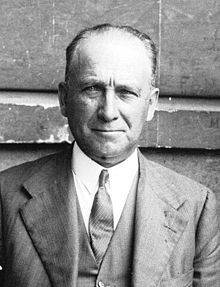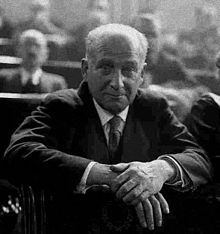Francisco Largo Caballero
Francisco Largo Caballero (born October 15, 1869 in Madrid , † March 23, 1946 in Paris ) was a Spanish politician and trade unionist . He was one of the historical leaders of the socialist party PSOE and the union General de Trabajadores (UGT).
Life
As a young man he made his living as a plasterer. In 1890 he took part in the first construction workers strike and in 1894 joined the PSOE. In 1905 he was elected to the City Council of Madrid. In 1917 he became a member of the Spanish Parliament ( Cortes ). After the death of the party founder Pablo Iglesias Posse in 1925, he succeeded him at the head of the party. He had been Secretary General of the UGT since 1918.
At the beginning of his political life he was moderate in his positions; he operated a certain degree of cooperation between the UGT and the dictatorial regime of General Miguel Primo de Rivera , which enabled the union to function under Primo de Rivera's military dictatorship. This was the beginning of his political conflict with Indalecio Prieto , which contradicted any kind of cooperation with the dictatorship.
From 1931 to 1933 he was Minister of Labor in the first cabinet of the Second Spanish Republic of Niceto Alcalá Zamora and that of Manuel Azaña . He enjoyed great popularity with the mass of workers, who saw their own poor existence reflected in his life. It was controversial among intellectuals.
In the elections on November 9, 1933, the right-wing Confederación Española de Derechas Autónomas (CEDA) won power in Spain. The government was nominally headed by centrist Alejandro Lerroux , but was dependent on parliamentary support from CEDA. As a result, Largo Caballero gave up his moderate positions, began to speak of a socialist revolution and became the spokesman for the left, Marxist-revolutionary wing of the UGT and the PSOE. When three CEDA ministers entered government in October 1934, he was one of the leaders of the hapless armed uprising by workers in Asturias and Catalonia , which was forcibly suppressed by the CEDA-dominated government.
He defended the alliance with other workers' parties and unions, such as the Communist Party of Spain ( PCE ) and the anarchist union Confederación Nacional del Trabajo (CNT). This brought him into conflict with Prieto again after the victory of this Frente Popular in the February 1936 elections: Manuel Azaña proposed that Prieto enter the government, but Largo Caballero blocked these attempts at cooperation between the PSOE and those of the republican parties Frente Popular educated government. Largo Caballero disliked fears of a coup d'état and predicted that if one did occur, it would be fought by a general strike that would open the door to a workers' revolution.
The event occurred on July 17, 1936, when the colonial army under General Francisco Franco and the Right staged a coup. Since they were not immediately successful, the Spanish Civil War developed (1936-1939), in which the republican forces were ultimately defeated.
On September 4, 1936, when the country was already in the middle of a civil war, Largo Caballero was appointed President of the Government and Minister of War. He advocated unity of the republican left of socialists, communists, POUM , anarcho-syndicalists and left-wing Catholics. In addition to waging war, he paid particular attention to maintaining the discipline and authority of the government within the Republican zone. The small Marxist party workers' unit POUM and the anarcho-syndicalists from the CNT turned against the dissolution of their party militias in favor of the republican army, in which they saw their influence waning through the political officers of the originally relatively insignificant Communist Party. Under pressure from Stalin , the PCE then led a dispute between May 3rd and 8th 1937 (May events , "War in War") with the left Marxist POUM, which was defamed as Trotskyist , and the anarchist CNT. The communists used this as an opportunity to provoke a government crisis and to force Largo Caballero to resign on May 17, which led to the second Popular Front cabinet of Juan Negrín , who, also a member of the PSOE, was closer to the communists. The extensive social revolution that took place in autumn 1936 was withdrawn.
After the defeat of the republic in 1939, Largo Caballero fled to France, where he was arrested by the German occupation troops in France in 1942 and imprisoned in Sachsenhausen concentration camp until the Red Army liberated him towards the end of the war . He died in exile in Paris in 1946 , where his body rested until it was returned to Madrid in 1978.
The UGT union named its foundation after Francisco Largo Caballero.
Web links
- Newspaper article about Francisco Largo Caballero in the press kit 20th Century of the ZBW - Leibniz Information Center for Economics .
| predecessor | Office | successor |
|---|---|---|
| José Giral Pereira |
Government President of Spain 1936–1937 |
Juan Negrin |
| personal data | |
|---|---|
| SURNAME | Largo Caballero, Francisco |
| ALTERNATIVE NAMES | Caballero, Largo |
| BRIEF DESCRIPTION | Spanish politician and President of the Second Republic |
| DATE OF BIRTH | October 15, 1869 |
| PLACE OF BIRTH | Madrid |
| DATE OF DEATH | March 23, 1946 |
| Place of death | Paris |


